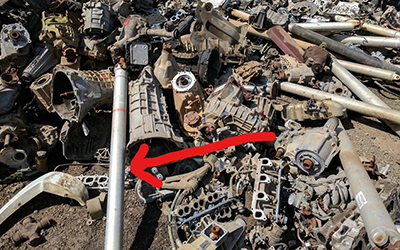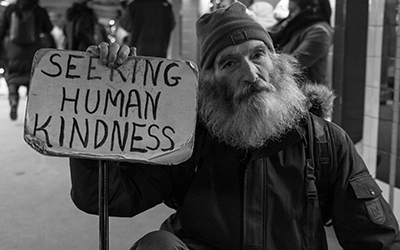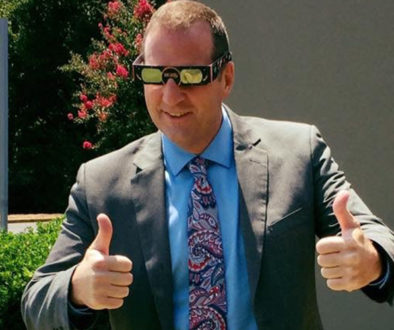Getting Run Over By A Bus Hurts
Getting Run Over By A Bus Is No Fun!
Being run over by a bus hurts in more ways than you can imagine.
The first time I met Janice she threatened to shove a 4 foot metal rod up my ass (her words, not mine).
Well, she didn’t technically threaten me.
She asked me if I was interested in having said rod shoved up my ass (again, her words, not mine)…
I told her I wasn’t interested. I told her I was certain…I wasn’t interested.
A Change In Lifestyle And Careers
In the year 2000 I had gone through some very serious personal issues. Not the least of which was recovery from an opioid use disorder.
Two years earlier I had walked out of an emergency room with 100 plus Darvocet following a car accident.
Opioid based pain killers ran my life for the next 2 years.
The turmoil and chaos of active addiction descended upon me and my family swiftly; and with grave consequences.
I Found Recovery
Fortunately, I found my way to recovery.
However, along with recovery came a new career in a new town.
When you are looking to reinvent yourself you take whatever you can find.
I found an entry level position doing street outreach work as a case-manager for a large behavioral health organization. We ran a community program providing services for people who suffered with serious and persistent mental illness.
The typical participant had a history that included homelessness, drug addiction, non-adherence with treatment and repeat admissions to psychiatric hospitals. In many cases, their history included all of the above.
The Day I Met Janice
By the time I met Janice I had been promoted to program manager.
I spent more days in the office than in the field. Administrative work.
This particular day started just as any other day. Nothing noteworthy.
However, I was quickly startled when the super secret emergency code came blasting over the intercom…
“Paging Dr. Blue…Dr. Blue please come to the lobby”.
“Dr. Blue” was code for emergency.
The planned response was for all staff to report (with urgency) to whatever area was designated in the announcement. In this case the lobby.
So I did what any red-blooded American fool would do. I ran sprinting to the lobby with no idea what was waiting for me.
I did it in an effort to impress everyone around me and possibly receive a promotion to CEO. ( Because of my valor and bravery. )
People Get Mad and Upset
Some people get really upset when you control their money.
When I got there I found Janice with the steel pole and she uttered those now infamous words:

I said: “Hello, my name is Rich. I’m the program manager here. What seems to be the problem? How can I help you?”.
Janice replied: “I have come to shove this pole up someone’s ass…are you game?”.
I said: “No…No I am not interested in that”.
Just Following “The Program”
Janice was there because we (the organization) served as the representative payee for her Social Security Disability Income (SSDI). In this capacity, the government sent her SSDI money directly to us instead of to Janice.
We made sure her bills were paid and food was purchased. The concern was, because Janice had an addiction issue, she would spend all her money on crack cocaine rather than rent and food.
Looking back on things, it seems pretty uncool to control participant money. But at the time we were just following the “program”.
Janice wanted some money that day and she had come with a pole and an attitude.
We Are Trained Professionals
We knew this type of behavior was possible with our participants and we were slow to contact the authorities.
We had been trained in deescalation techniques.
We were taught to try to resolve things ourselves before calling the police.
At the same time wielding a steel pipe, and threatening to do unspeakable things with it, is not acceptable in a civilized society.
Janice and I went back and forth a couple more times.
The Pole Procedure
She would describe the exact method she would use to complete the pole up the ass procedure.
I would suggest she “calm down and take a deep breath”.
While making sure I kept my “rear end” a safe distance from Janice.
Finally, I had to set the “we will call the police if you don’t calm down” boundary.
She responded and asked me: “Why, you scared?”…
I answered and responded: “Yes… I’m very scared”…
Maybe Janice had been down the “we will call the police” road before.
Or perhaps she felt pity for me. That would be understandable. This 5 foot tall, 100 pound woman had reduced all 6 foot 2 inches of me to a shaking mess.
Or perhaps, she knew I could and would help her if she let me.
The Change
Whatever the case, she threw the pole on the ground and agreed to come back to my office and “talk this through”.
She was still heated. But something had changed.
She told me later, months later, that she was stunned we didn’t call the police as soon as she arrived.
She told me that she knew I was “the real deal” and that’s why she stopped herself mid-tantrum.
I have no idea how she got the impression I was the real deal. I was truly scared to death.
Getting To Know Janice
Over the next year I got to know Janice relatively well.
Our program was very hands on. Lots of car time.
Getting benefits reinstated, completing HUD forms, even grocery shopping.
Our assertive community treatment team was no joke. We were truly in the mix with our participants
I was the “dual diagnosis” counselor on the team.
I worked directly with her on her substance use disorder goals. We spent time together in groups and recovery meetings as well.
She never talked about her past or her family.
I made an assumption she didn’t have any family involvement. She was homeless.
She was never able to identify anyone she could visit or stay with when in trouble.
Symptoms Stabilized
I was a rookie. I was very new to the mental health field.
We developed a productive therapeutic bond.
Janice never got “clean and sober” (ours was a harm reduction model) but her life did improve. She greatly reduced frequency of use and her mental health symptoms stabilized.
She was adhering to her medication.
We were able to help Janice get into her own apartment in the winter of 2001.
She finally had a home. She finally had a safe place to spend her nights.
She was doing so much better and had not been in a psychiatric hospital for almost a year.

Letters To Young Black Men
Janice gave me a book around this time. I reinforced these demographic facts with Janice. She didn’t even blink. She simply insisted I take the book. I followed her directions.
I still have the book. I cherish the book.
It means a lot to me today. As it did then.
Note: I was, and I still am, neither young nor black.
( Check out the book on Amazon – Click Here )
Christmas Eve 2002
Assertive community treatment was an all consuming program.
When one participant stabilized and gained independence, another participant immediately rose up to fill the crisis void.
Janice stabilized and other participants demanded more time. It was good news. This was exactly how it was supposed to work.
We rarely had a crisis call on Janice.
She maintained her outpatient appointments. She followed her medication protocols. She was in recovery.
Life was better. Not great. But much better.
This made the call on Christmas Eve 2002 all the more surprising.
Hit By A Bus???
We had an incoming call on the crisis line from Janice’s “uncle” (neighbor) who reported she was at the apartment “bleeding everywhere”.
He said she had been “hit by a bus” and was refusing to go to the hospital. She would not let him call an ambulance.
He did not know what to do.
The city was a busy place. A pedestrian getting tagged by a bus was not common. However, it was also not unheard of.
We told the uncle we would be right over.
When we arrived, it was clear that Janice had indeed been hit by a bus.
The bus had clipped her as she crossed the street. She was bleeding quite a bit from a cut on her scalp.
She had some other obvious injuries. It was not a life-threatening situation but she clearly needed to go to the hospital.
Go To The Hospital
Why won’t you just go to the hospital? Very quickly, the discussion got heated.
As we encouraged Janice to go to the hospital for care she became more and more angry.
I hadn’t seen Janice act like this in quite some time.
She was aggressively defending her right to refuse help. She was especially upset when we suggested getting an ambulance on scene.
We could not let this go on for long. She needed to get medical treatment. Therefore, we called the ambulance despite her protests (which had become louder and more demonstrative).
The police and ambulance arrived.
Fortunately, this crew handled Janice with great care. Sometimes the police are all business and have little time for these type of “mental health games”.
In this case, they were very compassionate.
Been Down This Road Before
Janice, was able to quickly get her self under control when the police officer and ambulance crew entered the apartment.
The officer approached her and talked quietly about what had happened with the bus. The paramedics began to dress the wound on her scalp. The situation was brought under control.
I took a breath and thought “Thank God”.
But she still needed transport to the hospital.
Janice knew she would be taken by the police if she continued to refuse to go via ambulance. She had been down this road before.
Janice began to weep uncontrollably. She was begging to not be taken to the hospital. We were all taken aback.
We tried to comfort her. The officer was especially kind.
He asked her; “I don’t get it… Why won’t you just go to the hospital and get this taken care of?”
Everyone Has An “Origin Story”…
Janice then told us all the real reason she was against a trip to the hospital.
I had assumed it was the normal hospital aversion that so many of our participants had.
Most of the time a trip to the hospital equaled involuntary commitment.
Most of the time a trip to the hospital came at the end of a very nasty relapse.
Most of the time a trip to the hospital was perceived as some type of failure.
All of these were legitimate reasons, in my mind, to avoid the ambulance ride. However, they did not even approach Janice’s motivation for resisting the hospital.
It turns out that Janice hadn’t always been homeless. She hadn’t always been addicted to crack cocaine. It turns out that her schizophrenia diagnosis was late onset.
More To The Story
She began to tell us about her now grown daughter.
Janice had, in fact, been a good mom. Somewhere in the distant past she had cared for her children. A son and a daughter.
We all knew she had kids. It was mentioned in her records.
The kids had been taken away and become part of the child welfare system. There was little mention other than that.
But apparently, there was more to the story.
Before the wheels completely came off, Janice had struggled and fought for reunification.
There were periods of recovery. During these periods she would occasionally get time with her kids.
But then, when her daughter was around the age of 13, everything feel apart.
Gone Radio Silent
Janice de-compensated. She went on an extended tour of psychiatric hospitals, jails, rehabs and even the state hospital system.
Her kids grew up in the foster system. According to Janice, her daughter landed in a “good place” and did well. Her son, apparently, not so much.
Janice was unstable for the majority of the time as her kids grew up. However, she did try to connect during the brief periods of calm in the storm.
There was sporadic contact. Nothing sustained and then eventually it was radio silence. No contact.
Amazing! Truly Amazing!
However, during the past 2 years of stability Janice had reached out to her now grown daughter. Her daughter was living in another state but they were able to connect.
Although reluctant at first, Janice’s daughter became more and more open to contact. They talked on the phone semi-regularly.
Janice shared: “My daughter became a doctor! My daughter is smart and successful”!
Janice was the proudest person on the face of the earth.
She then gave us the bottom line.
Her daughter had agreed to come visit her for Christmas. She was supposed to arrive later that evening. If Janice was in the hospital when her daughter arrived she would miss her visit.
Worse yet, her daughter would think “here we go again”.
Wow… I think about this 17 years later and I am stunned by the story.
It All Worked Out
Of course, we were able to contact the daughter that day. We were able to make arrangements for her to visit Janice in the hospital.
We verified that Janice had not relapsed and we advocated for Janice and her daughter’s reunion.
In the end everything worked out…Had we known that Janice had this back story we would have taken care of things right up front…
Society’s Narrative
That is what is most troubling. Why did we assume that there was no family connection?
Why didn’t I probe deeper for information on her family?
I made a judgement without all the facts. I allowed myself to feed into the narrative. Society’s narrative.
Think about it. We do it everyday.
This is What We Do!
We tell ourselves stories about people even though we know nothing about them. We tell ourselves stories that fit into stereotypes.
Then we make up our mind about co-workers, people we see in the street, people we see on television without any background information.
We allow society to tell us who is good and who is bad. Who is worthy and who is worthless.
Homeless people have families that love them.
People who are “hopelessly” addicted and mentally ill have families and kids they love.
They were children once. They were parents once.
Human Being First
The experience with Janice changed me.
I see a human being first.
Not a patient or a “label”. Certainly not a stereotype.
Don’t judge me for judging Janice in 2002. I learned from the experience.
I have lived out a different perspective for 17 plus years.
Check yourself…





